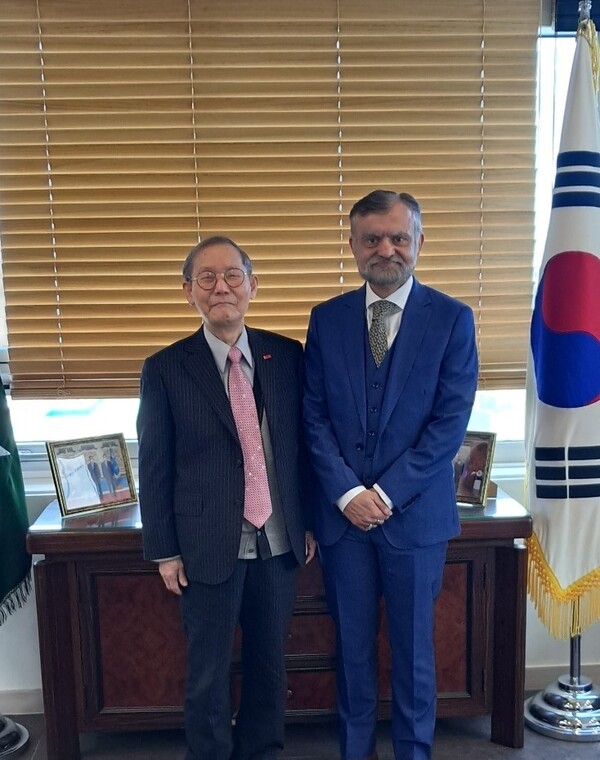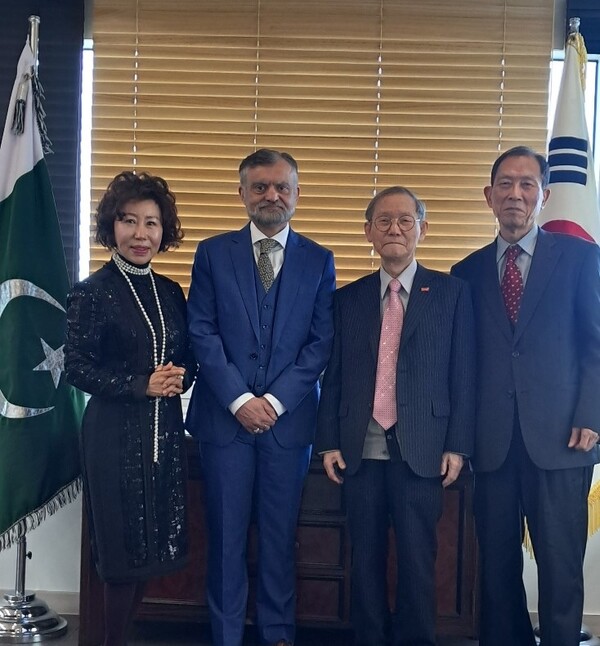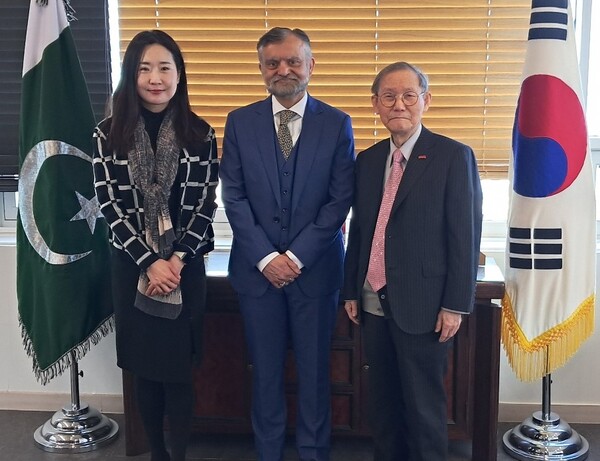States Ambassador Nabeel Munir of Pakistan at an interview with The Korea Post
By Publisher-Chairman Lee Kyung-sik, VCs Choe Nam-suk, Joy Cho, Reporter Soobin Kim
The Islamic Republic of Pakistan celebrated her National Day on March 23, 2024 as Korea does her Liberation Day on August 15 every year. Pakistan and Korea share many things in common, and have a very large range of areas where the two countries could substantially benefit from increased win-win cooperation.
Here are details of an interview which Ambassador Nabeel Munior of Pakistan in Seoul with The Korea Post media, publisher of 3 English and 2 Korean-language news publications since 1985:
Question: Please elaborate the significance of National Day of Pakistan, March 23rd
Answer: Pakistan commemorates 23rd March as its National Day. It is, for us, a day to remember and pay tribute to the achievements and the political struggle of the leaders of the Pakistan Movement, ably led by the Founder of the Nation, Quaid-e-Azam Muhammad Ali Jinnah. They were able to unite the nation, in a challenging environment, through their unparalleled sacrifices.
Eighty-four years ago on this day, our founding fathers adopted the historic ‘Pakistan Resolution’ in the city of Lahore. Based on the ‘Two-Nation Theory’, this was a landmark in the history of political consciousness of British India, as it demanded the creation of a separate state. And then, based on this ideology, Pakistan came into being seven years later, on 14 August 1947.
The day is also a time for reflection, and of renewing our resolve to continue working towards fulfilling the promise and the potential that this land of 240 million great people possesses.

Q: Please introduce major industry and products of Pakistan.
A: Pakistan is a big country, with a great diversity of people, climate, cultures and products. Its industry is also diverse in nature.
Pakistan has always had a strong agricultural base. Food crops like wheat, rice, sugarcane and maize are a source of great national wealth. Additionally, agriculture also provides raw materials to different industries, including cotton for our textile sector.
In the agriculture sector, opportunities exist in value addition, from milk to fruits, meat to vegetables and animal breeding and livestock development to horticulture.
With a youthful population, availability of low-cost human resource and an English language proficient man-power, IT is the future backbone of the economy. The IT landscape provides a lot of opportunities. Ignite National Technology Fund Pakistan has, for instance, signed an MOU with Born2Global Korea for partnership and collaboration in deep-tech startups. But this is just the beginning. The rapidly increasing Korean needs for quality IT products could be sourced from Pakistan.
Textiles, leather products, sports goods, surgical equipment, and agro-based goods are some of the other key industrial products of Pakistan. Let me give you some details of just one: the leather industry in Pakistan comprises approximately 800 small, medium, and large industrial units and tanneries. Globally, demand for leather garments exhibits a stable trend, and demand for leather products continues to expand. Pakistan is well positioned in this regard because of the availability of finished leather and competitive labor cost. The ROK is currently importing leather-hides and leather-goods worth approximately US$ 4.5 billion. Potential for Pakistani leather product exports to the ROK is therefore huge.
Another example is that for fisheries. Korean companies can benefit by investing in fisheries or by exploring joint ventures or greenfield investments in Pakistan. ROK imports seafood worth approximately US$ 5 billion. Again, this potential that can be exploited.

Q: Please introduce the investment environment in Pakistan, and special favors to foreign investors
A: Pakistan is an economy of close to US$ 350 billion, with the population of 240 million, 65% of which comprises of young people. Strategically located at the cross-roads of centuries-old trade and transport corridors, Pakistan is also a gateway to the energy-rich Central Asia. With proximity to Gulf States and the Far East, it forms a natural bridge, making it a marketplace teeming with possibilities.
As I said, almost two-thirds of Pakistan’s 240 million population is below the age of 30. And it is not just the numbers, we boast a workforce that is trained, hardworking and intelligent. Pakistan also possesses a large pool of well-educated and experienced engineers, bankers, lawyers, IT and other professionals, many with substantial international experience.
Pakistan’s Investment Policy (2023) is designed to provide a comprehensive framework for creating a conducive business environment to attract Foreign Direct Investment. With liberalization, de-regulation, privatization, and facilitation being the cornerstones, our policy trends have been consistent. Almost all sectors of the economy are open to investment, and attractive incentives and liberal policies provide the investors a competitive business environment.
The Policy also provides assurances of basic rights of due process, enforcement of laws and contracts, and provision of security. Foreign investors in any sector are allowed, at any time, to repatriate profits, dividends, or any other funds. It also reinforces the commitment to security and safety of investments. Other critical issues of interest to a foreign investor, including fair and equitable treatment, access to national and international arbitration, and intellectual property protection are also covered in the Policy.
Additionally, the Special Economic Zones Law allows creation of industrial clusters with liberal incentives, infrastructure, and investor-facilitation services to enhance productivity, and reduce the cost of doing business. It envisages ‘After-Care’ service for investors, and caters to the needs of global challenges of competitiveness.
The recently established high-powered Special Investment Facilitation Council, Chaired by the Prime Minister, provides a one-window facility to the foreign investors. It primary aim is facilitating FDI.

Q: What industrial sectors would be most attractive to Korean companies to invest in Pakistan
A: Possible areas in which Korean companies can invest include agriculture, livestock, energy, minerals, food processing, automotive, IT, textiles, housing & construction, logistics, to name a few.
Pakistan has designated 16 Special Economic Zones (SEZs) which offer lucrative incentives for incoming enterprises. Korean companies are welcome to start a business in an already established SEZ or develop a Korean SEZ anywhere in Pakistan. Benefits under the SEZ Law include a one-time exemption from custom duties and taxes for all capital goods imported into Pakistan for the development, operation and maintenance of a SEZ (both for the developer as well as for the zone enterprise) and exemption from all taxes on income for a period of ten years. They can also repatriate their profits without any conditions and restrictions.
Since enacting the Climate Change Act in 2017, Pakistan has been actively implementing policies to respond to the adverse impacts of climate change, to keep pace with the needs of the times. This has opened up opportunities for both Pakistan and Korea to collaborate in the future to contribute to building global infrastructure to respond to climate change.
Korean EV manufacturers, looking to expand their market share or new companies looking for investment in the auto sector, could exploit the relatively new EV and/or hybrid vehicles market in the country. Pakistan also has a huge two-wheeler/motorcycle market with annual average growth of 30%. Smaller investors can may look into this area as well.
We are also seeking investors in solar power systems to utilize renewable energy as sunny and clear weather lasts about 270 days of the year, excluding the July-August rainy season, making it a very favorable environment for solar energy generation. For these projects, Pakistan is collaborating with various countries, and I hope that Korea's solar companies can collaborate through joint ventures or independently to invest in this area.
The Korea Plant Industry Association (KOPIA) cooperation project in Pakistan, focusing on achieving 100% self-sufficiency of seed potatoes by 2028 is already in operation. KOPIA center can act as a window for cooperation in agricultural technology between the two countries and actively support local activities.
The size of Pakistan’s population, its agricultural output, its young IT savvy workforce, and an increasing demand for goods and services, makes it a perfect country to invest in. Additionally, Pakistan could also be a gateway to huge markets in Central Asia, the Middle East and beyond. So, to Korean investors I say, Pakistan is open for business.
Q: Please introduce currently outstanding Korean companies in Pakistan
A: For several decades, a large number of Korean companies have been profitably operating in Pakistan in diverse sectors. Daewoo, Lotte, LG, Hyundai and KIA, are household names in Pakistan.
Many hydropower projects in Pakistan have been constructed, and many are also being operated in Pakistan by Korean companies. K-Water, KHNP, KOEN, Daewoo, Lotte, Daelim, and SKEC are examples of these success stories.
Q: Please introduce tourist attractions in Pakistan for Korean tourists
A: From the mighty stretches of the Karakorams, the Hamalayas and the Hindu Kush in the North, to the vast alluvial delta of the Indus River in the South, Pakistan is a land of diversity and beauty. It is known for its breathtaking landscape, amazing geography, glorious history, diverse climate and clearly defined four seasons, making it irresistible for a tourist to visit this amazing land.
Five of the top 14 mountains in the world (that are over 8000 meters high) are in Pakistan. K-2, the second highest mountain, is also in Pakistan. Then we also have smaller peaks for amateur hikers. They can also enjoy white water rafting and other adventure sports.
For the nature lover, Pakistan offers have beautiful pristine green valleys.
Then we also have a rich tradition of religious and cultural tourism. So, if you want to go for cultural tourism, I think the best place would be Lahore. If you want to go for mountains, you have to go to the North. We also have beautiful beaches and deserts in the south of the country.
For religious tourism, we have Buddhist, Sikh and Hindu religion’s sacred sites. We have Taxila, Harappa and Moenjodaro, where relics of civilizations that existed thousands of years ago are preserved.
Monk Maranantha, who brought Buddhism to Korea almost 1600 years ago, came from Pakistan. And many of those monasteries are also very well preserved.
For the food lovers, Pakistan also offers a very unique blend of South Asian, Central Asian, Persian and Middle Eastern cuisine.
In short, Pakistan is an amazing country, that offers something for everyone.

